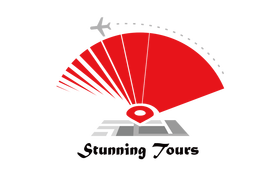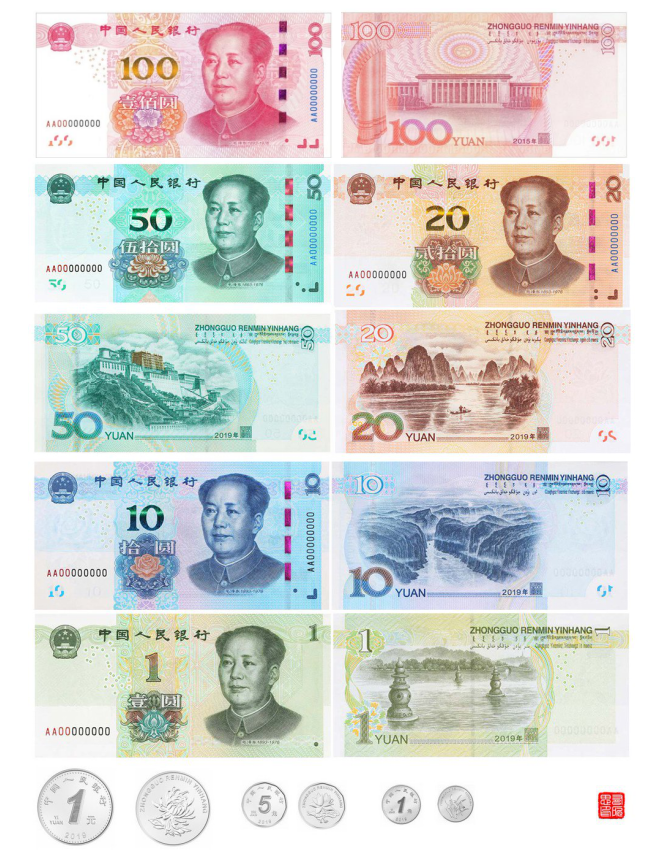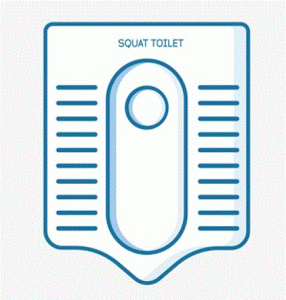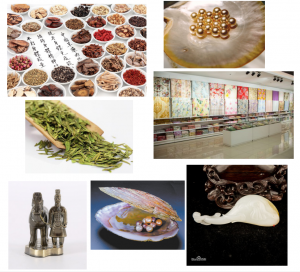1.Chinese currency
The official currency of China is the YUAN, known as RMB. RMB notes is available for 1RMB, 5RMB, 10RMB, 20RMB, 50RMB, and 100RMB. According to the currency exchange rates in recent years, 1 US “dollars” equals around 6.1-7.2 Chinese “Yuan”.
2.Exchange currency in China.
Most of the Chinese banks ATM do not accept foreign cards,almost all the hotels can help to change US currency cash to Chinese currency.
3.How much cash to bring
Tips and optional tours can be paid in USD/RMB. Aside from 10 USD per person per day standard tips for tour guide and bus driver (if you prepaid, you do not need to tip again) and the cost of optional tours, you need cash for meals and personal expenses. Meals can be estimated at around 30-60 RMB(5-10 USD) per meal per person and cash is preferred all the time. Although more and more businesses now accept Visa and Mastercard, the most widely accepted card scheme is UnionPay. You want to inform your bank that you are going to China, so that your card will not be canceled mid-trip for unusual.
4.Alipay and WeChat Pay
The Chinese use their phones to pay for absolutely everything, from street food to clothing and public transport. Unfortunately, the most common payment platforms – Alipay and WeChat Pay – require a Chinese bank account linked to them.
Northern China (Beijing, Xi’an) features windy spring, hot summer, pleasant autumn and a long and chilly winter. Beijing sees most of its rainfall in July and August, while most of the time it’s dry. Hottest days happen in summer (June, July, August) when temperature climbs to as high as 90 degrees. Coldest days in winter (December, January and February) bring the temperature down to as low as 20 degrees. You may make a packing list by season.
Southern China (Shanghai, Suzhou, Hangzhou, Yangtze River) features a pleasant spring, hot and rainy summers and comfortable cool autumn. While in winters the temperature tends to be higher than northern China, the fact that southern China doesn’t have central heating system makes winter in the south cold and damp. Temperature in the south climbs to as high as 85 degrees in the summer and goes down to as low as 40 degrees in the winter. You may make a packing list by season.
Beijing Monthly Temperature Averages
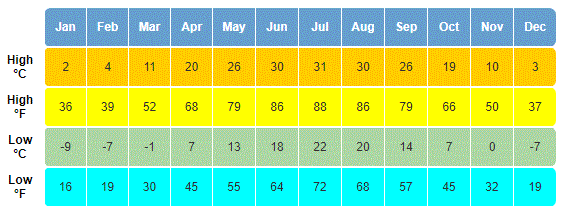
Shanghai Monthly Temperature Averages
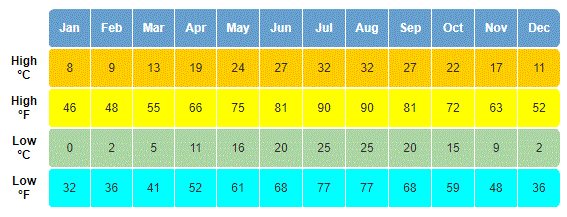
1. SIM card
China’s major carriers include China Telecom, China Mobile and China Unicom. SIM cards can be purchased at the airport with your passport. You need to check if your phone is unlocked to use a Chinese SIM card before that, and we can not help to set up SIM cards ahead of time.
2. International roaming services
International roaming is easy with plans that allow you to use your mobile device while you are traveling outside of the United States.If your mobile phone will work abroad, check your carrier’s roaming rates.Please also verify with your carrier that international roaming is activated before you travel.
3. How to stay in touch with your family
Facebook/Google/Youtube/Instagram/Twitter/Skype are blocked in China.
Wechat (Click to download) is regarded as the best app to use in China to stay in touch with your friends in the U.S.,and it supports text messages, pictures,voice and video calls. It just needs an internet connection such as Cellular or WiFi, and most of the restaurants have free WiFi for customers, and hotels also provide free WiFi.
Skype is not blocked in China. However, if you try to download Skype app is blocked on iOS app market or one of Android markets once you’re in China. If you want to use Skype in China, we recommend that you download it to all of your devices before going.
FaceTime continues to work in China without the need to use a VPN. So, if you have an iOS device, FaceTime is a good option for making calls from China.
During summer, China is 15 hours ahead of U.S. West Coast (12 hours for U.S. East Coast); It is normal that you depart on the 5th of May and arrive China at the 6th.
During winter, China is 16 hours ahead of U.S.West Coast (13 hours for U.S. East Coast). It’s normal that you lost a day when flying from the United States to China.
For example:
Los angeles depart Oct24@1:05am – Shanghai arrival Oct25@6:00am (flight length: 13h55m)
Shanghai depart Oct28@1:00pm – Los angeles arrival Oct28@10:05am (flight length: 12h05m)
USA mostly use the standard of 110-120 volts at a frequency of 60 Hz, while China uses generally 220V, 50HZ, AC (Hong Kong is 200V; Taiwan is 110V). Check out the Voltage for your lap tops to see if they fit into 220 V. If not, you need to use a converter also.
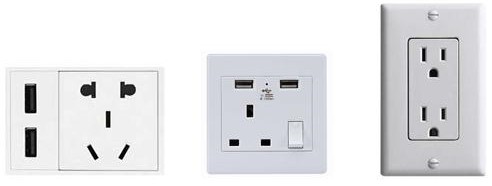
(Above from left to right: mainland China, HongKong and Macau China, Taiwan China)
For most of the flights out of the U.S. to China, usually you are allowed to bring 2 free checked luggage with limit of 23 kg(50 lbs) each and 1 carry on baggage within 5 kg (11 lbs),subject to change. Whereas for domestic flight in China, there is only 1 free checked luggage with limit of 20 kg(44 lbs), and 1 carry on luggage within 4.5 kg(10 lbs). so please try to pack lightly. For the cost of extra luggage, it depends on different airline luggage restrictions, and we can not purchase for you ahead of time,but tour guide will help you with that at the airport. Please try to pack lightly, since elevator/escalator aren’t as universal as in the U.S. at the airport/train station/cruise port.
(Here is an example of the luggage size with Air China)
1. Toilet style
Western style toilets are very common in most of Chinese public facilities, such as airports, train stations, hotels and shopping malls. However, in some crowded tourist attractions and highway rest areas, they may only provide squat toilets (as picture on the right).
Bringing some pocket tissues is necessary. Most Chinese toilets do not provide toilet paper, hotels and some of the restaurants will have it available. Carrying some baby wipes or a small bottle of hand sanitizer is recommended as well.
2. Drinking water in China
Do not drink tap water in China. Tap water is not drinkable and bottled water can be purchased very cheaply at most restaurants and stores.Hotels also provide bottled water.
1. Check-in & Check-out
For most of Chinese hotels, check in is generally after 12:00 p.m. and check out is usually by noon the next day.
2. Hotel beds
Chinese people believe hard beds/mattresses are good for their back and it’s common that U.S. travelers feel the beds hard in hotels. We usually recommend our guests to ask the front desk for extra comforter to put on top of the mattress.
3. Hotel breakfast
1. Food requirements
Different Chinese dishes will be provided when there is certain mail included, so be sure to verify the ingredients with the guide if you have allergies, or if you are vegetarian…etc.
2. Physical requirements
Based on the average age of the group members, the overall pace can be different. The challenge of the trip depends on where you visit on a particular day. For example, the visit to the Forbidden City can be rather tiring because of the sheer size of the palace. If necessary, please ask the tour guide for the possibility of renting a wheelchair. It’s okay to stay at bus for some rest if you feel too tired. There is no elevator available at Yangtze River cruise port and you need to carry the luggage up stairs. Wheelchair is usually available for renting at around $80/day, but you need to have a travel companion to push the wheelchair for you.
3. Special requests on airplanes
If you have requests on airplanes, like wheelchair, vegetarian meal…etc, please notify us in advance.
4. Seats selection on the plane
There are increasing numbers of airlines charge fees to pre-select seats. The prices vary by airlines. If needed, you may contact airlines to make seat selections directly and please be noted that you might experience long waiting time when you call the airlines.Or you may try to select seat on their website, but it’s normal if they do not allow you to pre-select seats. If you prefer us to call the airlines on your behalf, our service fee is $50 per person.
Most travelers want to take home some souvenirs or mementos. With so many options available, shopping can be time consuming, confusing, and exhausting. Here recommends you what things to buy:
- Beijing: Chinese herb, freshwater pearls, Chinese jade
- Shanghai: silk carpets, qipaos
- Hangzhou: Longjing tea, silk
- Suzhou: silk
- Xi’an: replicas of the Terracotta Warriors
- Chengdu: panda goods
Most shops provide services to help customers to purchase souvenirs and have them shipped home overseas.
You do not have a tour guide and bus driver except during scheduled tour, but public transportation such as taxi and metro are convenient.
1. Taxi
Most taxi drivers do not speak English, so you can get your destination address written in Chinese by someone at your hotel.Though it varies from city to city, taxi rates are usually fixed for the first 3-5 kilometers, then somewhere around 2-3 Chinese yuan for each additional kilometer. Make sure they turn on their meter, otherwise get out immediately. No need to tip either.
2. Metro
Public transportation is widely available and efficient in China. Metro is popular in major cities such as Beijing and Shanghai. Metro tickets are sold by English- speaking conductor or by automatic machines with English instructions. English signs are available everywhere at the station as well.
3. Autonavi Navigation (app) (click to download)
Since Google (and therefore Google Maps) is blocked in China, this is the best way to properly navigate around town. Autonavi Navigation is China’s most popular GPS with maps app. Now it supports English language. The app works the same like Google Maps, which lets you calculate directions.
1. Traveling Solo
Stunning Tours do not match roommates for our clients. If you are planning to travel alone, please make sure to purchase single supplement so you have your own room.
2. Traveling with a group of your friends
If you are traveling with your family or friends, please be sure to notify your travel agents, so we can help to arrange your group on the same bus. If you are sharing a room with your friend, please also advise your travel agent.
3. Our group tour size
For regular group tour, usually we put a maximum of 36 passengers on a bus. But the number of passengers may be fewer. April/May/September/October are the most popular period for traveling to China, so the group size might reach the maximum. When necessary, there are two buses for the whole group, and one tour guide on each bus. For small group tour, the group size will be upto 10-20 passengers.
Chinese culture is one of the world’s oldest cultures, tracing back to thousands of years ago. Important components of Chinese culture includes ceramics, architecture, music, literature, martial arts, cuisine, visual arts, philosophy and religion.
Ethnic Groups-Officially there are 56 recognized ethnic groups in China, Han Chinese being the largest group. Many ethnic groups, though merge into Han identity, have maintained distinct linguistic and regional cultural traditions. Even within one ethnic group, there are probably diverse groups of people. Various groups of the Miao minority, for example, speak different dialects of the Hmong-Mie languages, Tai-Kadai languages, and Chinese, and practice a variety of different cultural customs. Typically each minority group has their own costumes, festivals and customs. For example, various marriage customs are found amoung different minority groups. There is actually a museum that features marriage customs of ethnic groups-Guizhou Museum of Marriage Customs.
Religion-Confucianism and Taoism, later joined by Buddhism, constitute the “three teachings” that historically have shaped Chinese culture. There are no clear boundaries between these intertwined religious systems, which don’t claim to be exclusive, and elements of each enrich popular or folk religion. Folk or popular religion, the most widespread system of beliefs and practices has evolved and adapted since at least Shang and Zhou dynasties. During the period fundamental elements of a theology and spiritual explanation for the nature of the universe emerged. Basically, it consists in allegiance to the “shen”, a character that signifies a variety of gods and immortals, who can be deities of the natural environment of ancestral principles of human groups, concepts of civility, cultural heroes, many of whom feature in Chinese mythology and history. Recent surveys estimated that some 80% of Han Chinese practice some kind of Chinese folk religion and Taoism; 10-16% are Buddihists; 3-4% are Christians; and 1-2% are Muslims.
